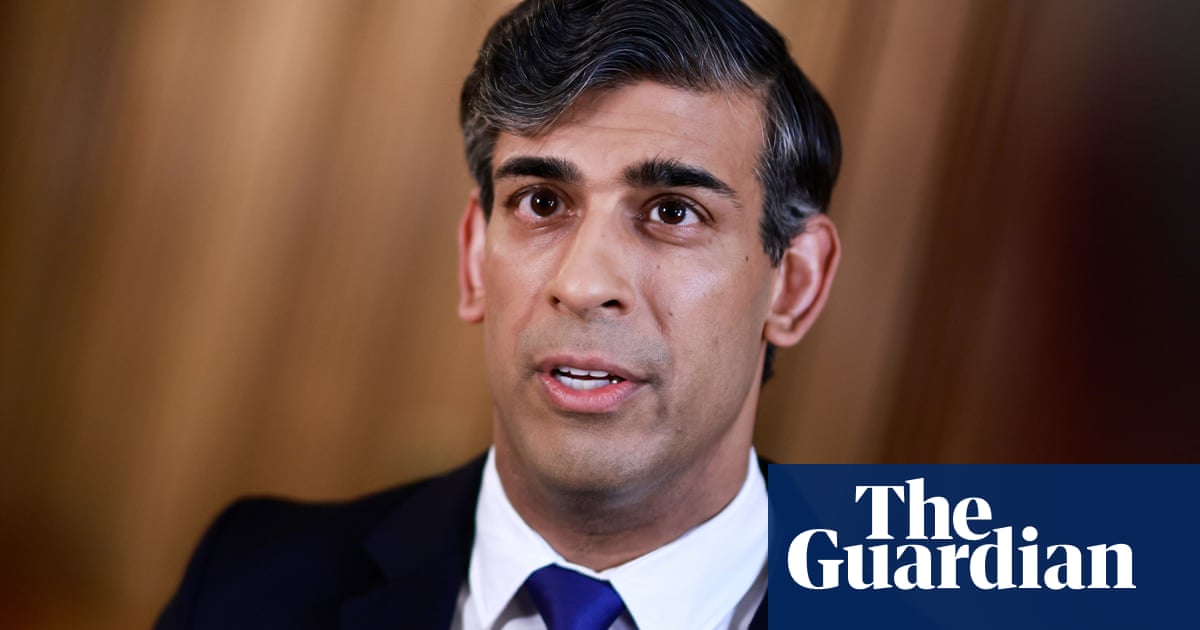Sunak hopes of pre-election interest rate cuts frustrated by inflation slow puncture

When the Bank of England governor, Andrew Bailey, told an event in Washington on Tuesday that the UK economy was “disinflating”, it raised the hopes of mortgage payers and indebted businesses that a cut in the cost of borrowing could be on the way soon.
But less than 24 hours later, the latest UK inflation data and worsening interest rate forecasts have curtailed those aspirations.
The figures from the Office for National Statistics released on Wednesday showed a fall in the consumer prices index to 3.2% in March, worse than the expected 3.1%.
Meanwhile, City investors, who previously had run ahead of Bailey’s signalling to bet on four or even five interest rate cuts this year, now consider the governor’s talk of the disinflation process “working its way through” to be overoptimistic.
Last week, investors were putting their money on the Bank’s first interest rate cut taking effect in August, with many also predicting an earlier date. Now the expectation is increasingly skewed towards a first cut in September or even November.
A half-point cut by the end of the year is priced into financial markets, when only a few months ago the expectation was that there would be a 1.25 percentage point cut.
Currency dealers agree that a later date is more likely. Across the Atlantic there has been speculation that the Federal Reserve will delay its first cuts in the cost of borrowing after a rebound in US inflation to 3.5% last week.
This would make the UK the first of the two central banks to cut, an expectation that pushed down the pound from $1.27 to 1.24 against the dollar. In the wake of Wednesday’s UK inflation figures the pound has begun to recover.
The prospect of a first cut as late as November plays badly for Rishi Sunak, who is widely expected to delay a general election to the autumn in order to benefit from an improving economy. An essential element of any improvement would be the prospect of reduced interest rates.
The Conservatives calculate that lower borrowing costs will bring back into the Tory fold many of the mortgage-paying millennials who have deserted them in recent years. To maintain any chance of this happening before the election, Sunak could pick a December or even January date. Yet even such a delay may not be enough.
Bailey hedged his bets in his speech to the International Monetary Fund event in Washington by saying the global situation remained volatile and the prospect of renewed disruption to shipping could increase prices again.
The governor has come under fire more than once for describing the last two years of inflation as transitory, given the UK is considered to be the most open economy in the developed world and therefore the most likely to catch an economic cold when the world sneezes.
after newsletter promotion
The coronavirus pandemic and the Russian invasion of Ukraine spelled disaster for a country dependent on imported energy and food.
In essence, Bailey was, and remains, correct. Fuel and energy prices were bound to settle, and when they did, the inflation cycle would be over.
He might say he was only wrong about the length of the transition, blaming it on the war in Ukraine, which he failed to foresee, like many others.
However, March’s inflation figures show that core inflation, which strips out energy, food, alcohol and tobacco, declined only to 4.2% in March from 4.5% the previous month. Analysts had expected a decline to 4.1%.
Services inflation, which is closely monitored by the Bank as an indicator of domestic price pressure, fell even less and remains high at 6%, down on 6.1% in February.
It is these figures that are influencing the financial markets. They fear the UK has failed to tackle the essential building blocks of inflation. If that is true, interest rates will remain high well into 2025.
Related
Why investing in women is a vital next step for…
Get Nadine White's Race Report newsletter for a fresh perspective on the week's newsGet our free newsletter from The Independent's Race CorrespondentGet our fre
Business secretary signals major shift on electric car policy to…
In a determined effort to retain Nissan’s manufacturing presence in Britain, Business Secretary Jonathan Reynolds has vowed to implement “substantial c
Joint Statement: Business Secretary and Fujitsu Services Ltd
Business and Trade Secretary Jonathan Reynolds today (Friday 7 March) met chiefs for Fujitsu in Tokyo to begin talks over the cost of redress for victims of th
UK foreign secretary backs multilateral defence funding for Europe
UK foreign secretary David Lammy has said that a new multilateral fund will be needed to secure Europe’s defence as he confirmed that Britain is “open to”













